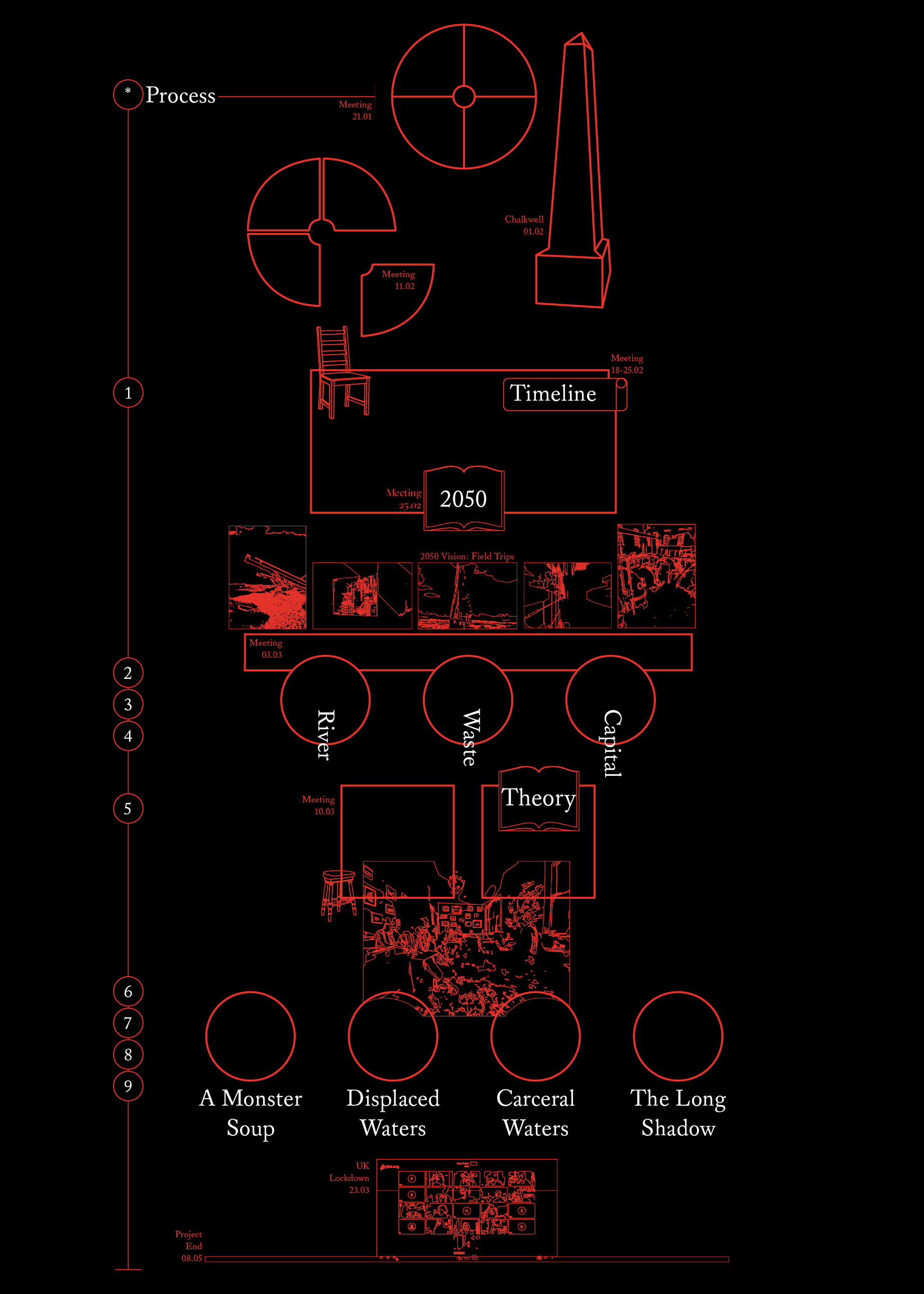The Hydrosocial Thames
Conflicts & Negotiations Project
2019-20 MA Cohort

The river Thames is deeply embedded in the history of London's financial,
ecological, infrastructural, and logistical development. It has and continues
to be an organising principle in the design of the city's multiple
architectures. Focusing on its speculative dimensions, we decided to examine
the "Thames 2050 Vision" report through the Thames estuary.
Challenging the prevailing vision for the Thames and London in 2050, MA students sought to weave together expertise from various fields and actors in order to demonstrate an inclusive and complex analysis of the city's development. They took the London Docklands as an entry point into the movement and organisation of river, waste, and capital as well as their rippling effects over the area. London Docklands, once an integral part of global maritime trade, went through a process of "renewal", with Canary Wharf as the most notable area of regeneration. It became a 21st-century hub of global financial flows embodying both value and waste production.
A consideration of the hydrosocial relations between the greater London and the river Thames lead to a conceptualisation of the project around the tidal Thames as a confluence of multi-directional forces in and out of London as node (human migration, trade, capital, waters and currents...). Hydrosocial theories suggest that the management of water impacts the organisation of society. This, in turn, affects the disposition of water and gives rise to new forms of social organisation. Water and the social interact and transform each other through "a socio-natural process by which water and society make and remake each other over space and time" (Linton & Budds, 2014).
Bringing together these investigations, we observe the increasingly technocratic management of urban flows and circulations. Throughout time, the river is employed both as an asset and a "forgetting mechanism" into which society's undesirables are dropped—cleared from the land and kept away from metropolitan eyes and senses. While the value of waterfront views and riverside connectivity increase, what is ignored as the spectre of development inevitably returns in the form of logistical breakdowns (a monster soup), ecological disturbance (non-native species of displaced waters), mass imprisonment (carceral waters, and over-financialisation of neighbourhoods (Poplar in the long shadow of gentrification).
Challenging the prevailing vision for the Thames and London in 2050, MA students sought to weave together expertise from various fields and actors in order to demonstrate an inclusive and complex analysis of the city's development. They took the London Docklands as an entry point into the movement and organisation of river, waste, and capital as well as their rippling effects over the area. London Docklands, once an integral part of global maritime trade, went through a process of "renewal", with Canary Wharf as the most notable area of regeneration. It became a 21st-century hub of global financial flows embodying both value and waste production.
A consideration of the hydrosocial relations between the greater London and the river Thames lead to a conceptualisation of the project around the tidal Thames as a confluence of multi-directional forces in and out of London as node (human migration, trade, capital, waters and currents...). Hydrosocial theories suggest that the management of water impacts the organisation of society. This, in turn, affects the disposition of water and gives rise to new forms of social organisation. Water and the social interact and transform each other through "a socio-natural process by which water and society make and remake each other over space and time" (Linton & Budds, 2014).
Bringing together these investigations, we observe the increasingly technocratic management of urban flows and circulations. Throughout time, the river is employed both as an asset and a "forgetting mechanism" into which society's undesirables are dropped—cleared from the land and kept away from metropolitan eyes and senses. While the value of waterfront views and riverside connectivity increase, what is ignored as the spectre of development inevitably returns in the form of logistical breakdowns (a monster soup), ecological disturbance (non-native species of displaced waters), mass imprisonment (carceral waters, and over-financialisation of neighbourhoods (Poplar in the long shadow of gentrification).


